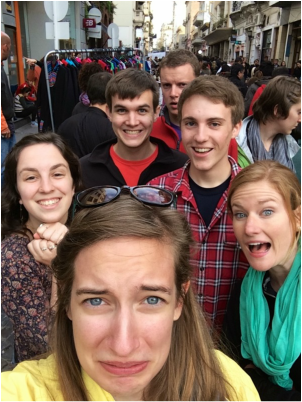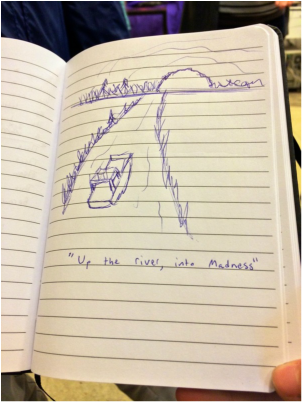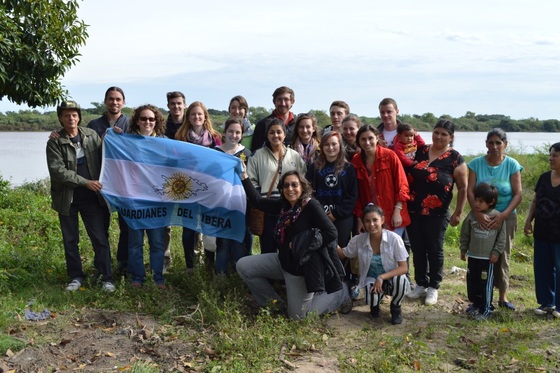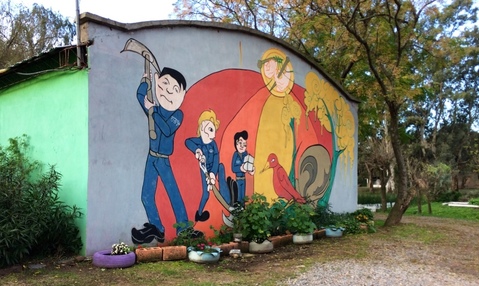|
Editor’s Note: This is the second post in a series on an undergraduate travel learning course, which included traveling to Argentina to study recuperated workplaces and social movements. Travel learning courses are regular semester-long courses that feature two weeks of travel after the semester to examine the issues studied in the course. This post was written by a student that completed the course
Like many college students, I travel hoping to gain insight. Like many aspiring sociologists, I wasn’t exactly sure what I was looking for. And had become increasingly convinced that even if it were to be happened upon, there would be no way to recognize it. The trip, consisting of twelve students, two professors, and the lone Spanish speaker: a woman named Delia who safeguarded us all, had spent two weeks in and around Buenos Aires picking apart worker cooperatives and recuperated businesses. Impressed and disillusioned, sometimes concurrently, we had spoken to many involved in different aspects of the movement. The media cooperative that served as an organizing hub and political sounding board, a suit factory that started it all and yet never really hit its ideological stride, former union members who are close to starting their own city-state. These businesses all exemplify the struggles and successes detailed in the documentary The Take, which originally piqued my interest in the subject matter. While the coursework that followed my acceptance to the Travel Learning program lacked the same zing, the material was interesting enough. The discussion was at times engaging, but overall the destination was clear, and decidedly removed from the classroom.  Miranda (front) and other students express their various emotions while traveling through Argentina. Miranda (front) and other students express their various emotions while traveling through Argentina.
However, I don’t view this as a negative. Often in the classroom there is little focus on the material having a practical application, much less creating change or altering the social landscape we were studying. Especially in classes focusing on race, social justice, and gender I’ve often found myself disengaging with the material. Overwhelmed by the problems of a system I have had no power in creating, and seeing few avenues for change that I could align myself with ideologically, the Travel Learning Course came at a pivotal time in my academic career. This was a chance to see and experience social change, a concept often discussed but little understood despite a plethora of theories, and to become fully immersed in these organizations with a group of at least marginally like-minded individuals.
Material from the class, which had during the semester seemed superfluous compared to the experiences we would have later, became suddenly more useful than any other theory I’ve ever studied. It allowed for a lingua franca and a cocoon of sorts to be built around our group. It was a means by which we could understand one another: agreeing, disagreeing, pulling out theoretical concepts, and attempting to find the answers to questions raised by the direct observation by reaching back to the academic base we had already established was comforting in a whirlwind tour of Argentina. The movement too found firm footing in theory. As one of our professors pointed out, those cooperatives who were more well-versed in theories about capitalism, community organization, workplace dynamics, and labor organization prospered, expanded, and helped to prop up newer organizations. UST, the sanitation workers cooperative we visited which had previously been unionized, was undoubtedly the best example of this. Impressive public relations and branding work were on display, we were given a tour, which they were marketing to the public, gifted news letters stickers bearing their logo, and given the chance to purchase goods produced by the cooperative and in line with their message. I purchased a glazed pot bearing some of the movements slogans, the most important of which I would argue was “solidarity.” We examined their struggles, as well as their successes, through the lens provided by the class and found unsurprisingly that openness in the workplace, horizontal power structures, and a sense of agency were as pronounced in this organization as were the benefits the community received from hosting it. On the other hand, those cooperatives that had not made use of these theories had considerable trouble maintaining the unity of workers and cultivating and understanding of what it meant to be a part of a worker-run organization.  A visual depiction of journeying with fellow students for 2 weeks. A visual depiction of journeying with fellow students for 2 weeks.
The group and the little cocoon we existed in were the best and worst part of the trip. As expected, bonds were formed quickly and firmly in the face of challenges like lost luggage, attempted navigation of the city, and shared exhaustion. But the tension within it was inescapable because of the language barrier and the extremely long days spent together. Similar to an organ transplant, those forced so quickly and utterly into my personal space were either completely incorporated, becoming central to my own functionality and feeling akin to a lost limb once we returned to the United States, or utterly rejected. Mostly based on personality type, I clung to the other thoughtful, generally introverted students. We had amazing discussions during meals, in our lodgings, on planes, overnight buses, river barges, and even during nights out on the town. We were enraptured with the movement, with the city, and with the culture we were lucky enough to experience rather than read about.
The most memorable parts of the trip were often the things and places we stumbled upon, like the BDSM club we mistook for a bar, or the dozen or so places we were convinced had The Best Empanadas Ever. And the people we were not necessarily expecting to meet, who were tangentially involved in the movement, but became crucial to our experience: like the son of the director of the media cooperative who helped our guide arrange much of our trip. He is about our age and had such a command of and ease with the city, the people, and discussing issues which we as students after taking a class focused on them still had trouble comprehending. Even he became an interesting topic of discussion: would his ease with the city take a different form if he were not male? How did his upbringing impact his involvement with these social justice causes, in what ways was this similar to what we were observing with a certain level of nepotism in recuperated businesses attempting to maintain their sense of purpose? In this respect, the trip was similar to many of my other travels because the tour guides we were lucky enough to have were some of the most interesting individuals we had the pleasure of meeting.
The constant need to absorb everything around me, and constantly looking for ways in which what we were studying was embedded in the society made it perhaps the most physically and mentally exhausting trips I’ve been on. The great and terrible thing about travel learning is that everything is an object of study, everything is an opportunity to gain insight that you could never get in a classroom alone. I’m not sure if I found what I was searching for, but I rediscovered travel as a means to get there. Maybe the Contemporary Literature Travel Learning course to Ireland this summer will hold all of the answers, but at the very least I know I’ll come away with closer friends and a better understanding of Dublin than I could ever glean from Ulysses.
Miranda Ames Miranda Ames is a junior at Ohio Wesleyan University (OWU) majoring in unemployment and minoring in over-scheduling.
BW
5/2/2015 11:34:23 pm
Such a fun read!
International Volunteer HQ (IVHQ) is offering students from around the world an opportunity to volunteer abroad while gaining course credits for their educational institution through the Spanish Service Learning Course (SPAN203SL). The course is available to IVHQ volunteers in Costa Rica, Guatemala and Peru - Cusco. The purpose of the Spanish Service Learning Course is to foster a sense of civic responsibility and community, to expose students to local culture and language, and to create an opportunity for students to broaden their global perspective and identity. Comments are closed.
|
.
.
Tags
All
|


 RSS Feed
RSS Feed